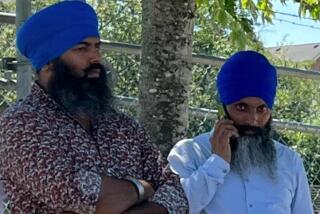Sikh Leader in Punjab Accord Assassinated
- Share via
NEW DELHI — Sikh terrorists assassinated top Sikh political leader Harchand Singh Longowal on Tuesday, less than a month after he signed an accord with the government to settle the three-year Punjab crisis.
The killing, which prompted a nationwide security alert, occurred hours after Sikh gunmen killed a Hindu leader of Prime Minister Rajiv Gandhi’s governing Congress-I Party and wounded two other Congress members in the Punjab city of Jullundur.
Longowal, president of the Sikhs’ main Akali Dal Party, was shot as he addressed a village temple meeting in his home district of Sangrur in Punjab state. Police said an unidentified man was killed and three others were critically wounded in the hail of gunfire.
2 of Killers Arrested
The 57-year-old Longowal, called sant or saint by his followers, died after undergoing emergency surgery performed by senior doctors who were flown in by the government.
Authorities said they arrested two of Longowal’s killers and were searching for two others. The two arrested suspects were identified as Halwinder Singh and Gian Singh. The United News of India said Longowal’s bodyguards had wounded Halwinder Singh.
Sikh moderates quickly called for a statewide general strike in Punjab today to protest the murder of their leader.
In a condolence message, Gandhi said, “A man of peace has fallen to the bullets of assassins. . . . He has left a void which is difficult to fill.”
The prime minister said Longowal’s killing “at this critical juncture is a tragedy not just for Punjab but for the whole country. He worked courageously . . . to remove hatred from the hearts of men and to bring peace after so much strife and pain.
“Anti-national forces are at work to frustrate forces of political reconciliation in Punjab. We must fight these forces unitedly,” Gandhi said.
His Cabinet met in emergency session Tuesday night to discuss the assassination.
The settlement signed July 24 was aimed at settling the festering crisis in Punjab, a prosperous, productive state, India’s breadbasket, occupying a strategic position in northwestern India bordering the country’s main adversary, Pakistan. The accord was also intended to satisfy the Sikhs who form a majority of its population. In the country as a whole, the 13 million Sikhs are only 2% of the population, but they are heavily represented in the military and in transport.
Sikhs have complained of job discrimination and of being overtaxed in Punjab. They wanted a greater share of interstate waters that were being diverted to neighboring states, and a merger of Chandigarh, joint capital of the states of Punjab and Haryana, with Punjab. Some called for secession from India.
Longowal, whose party in 1982 launched the campaign for greater political and religious autonomy for Punjab, advocated nonviolence and condemned the call by some Sikh militants for an independent Sikh nation.
But his campaign was overshadowed by the followers of another Sikh leader, fundamentalist Jarnail Singh Bhindranwale, 37, who was compared by some with Iran’s leader, the Ayatollah Ruhollah Khomeini, in his influence over young Sikhs. Rising tension between Sikh factions complicated the government’s efforts to work out a Punjab settlement, and extremists inspired by Bhindranwale pressed their cause with violence and assassinations. Nearly 4,500 were killed over the past three years.
The Punjab violence reached a peak in June, 1984, when the army attacked the Golden Temple in Amritsar, the holiest Sikh shrine, killing hundreds of Sikh militants who lived in the temple complex, and who the government said had turned it into an armory for Sikh terrorism.
Bhindranwale was killed in the fighting, but Longowal surrendered to government forces and was put under detention.
Sikhs were outraged by the army’s assault on their holiest shrine, and on Oct. 31, Prime Minister Indira Gandhi was assassinated by two of her Sikh guards.
Her son Rajiv succeeded to the prime ministership and moved to reach a settlement with moderate Sikhs led by Longowal. The effort bore fruit last month.
Rejected by Some Sikhs
But many Sikhs objected to the terms of the July accord. Fearing attacks on Longowal, the government furnished round-the-clock bodyguards for him.
Last weekend, Rajiv Gandhi called for elections Sept. 22 in Punjab, which has been under direct federal rule since the state government was dismissed two years ago for failing to stop terrorism. The Election Commission said it would study the situation in Punjab before deciding whether to go ahead with the elections.
The mantle of Sikh leadership now is expected to fall on two key leaders of Longowal’s moderate faction of the Akali Dal who have declined to accept the July Punjab settlement.
President Zail Singh, a Sikh, said of Tuesday’s assassination: “There are no words to condemn this dastardly act.”
In Washington, the State Department said the United States “strongly deplores yet another assassination of a prominent Indian leader” and described Longowal as a “courageous political figure attempting to promote communal reconciliation through the democratic process.”
In earlier attacks Tuesday, gunmen believed to be Sikh militants attacked the Jullundur home of Gurdial Saini, a Congress Party leader, killing Dev Dutt Khullar, a 62-year-old Congress Party member and Hindu village leader. Saini was seriously wounded and Sikh party worker Gurbachan Singh was wounded in the leg.
More to Read
Sign up for Essential California
The most important California stories and recommendations in your inbox every morning.
You may occasionally receive promotional content from the Los Angeles Times.













